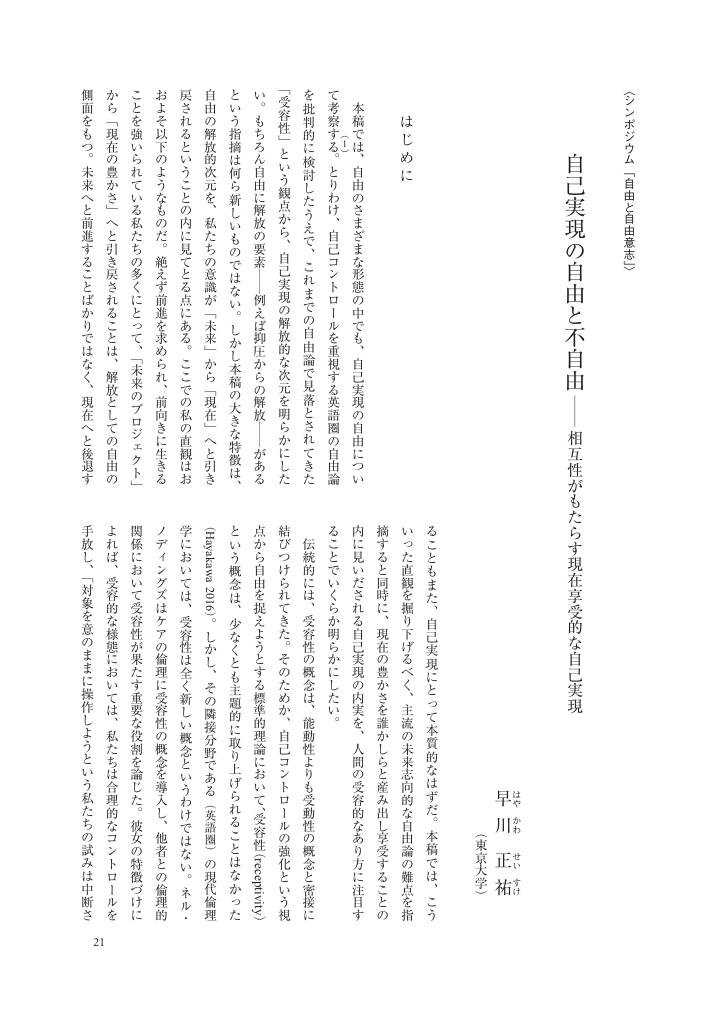4 0 0 0 OA 自己実現の自由と不自由 相互性がもたらす現在享受的な自己実現
- 著者
- 早川 正祐
- 出版者
- 日本哲学会
- 雑誌
- 哲学 (ISSN:03873358)
- 巻号頁・発行日
- vol.2021, no.72, pp.21-35, 2021-04-01 (Released:2021-05-20)
- 参考文献数
- 12
3 0 0 0 OA 分析的行為論におけるケア概念
- 著者
- 早川 正祐
- 出版者
- 日本哲学会
- 雑誌
- 哲学 (ISSN:03873358)
- 巻号頁・発行日
- vol.2008, no.59, pp.261-276,L20, 2008-04-01 (Released:2010-07-01)
- 参考文献数
- 12
Until now, mainstream philosophers of action have never taken seriously the fundamental fact that human agents are beings who care. Most philosophers have attempted to clarify the features of human agency mainly by analyzing intending, planning, and policy-making. In this paper, however, by introducing and analyzing the concept of care, I have tried to analyze human agency in the light of caring. Recognizing that the meanings of care are manifold, I focus first on one of the most central meanings of caring about/for X; if we care about/for X, we are continuously interested in X, and we consider X as important and significant to ourselves over an extended period of time. I then elucidate the distinctive features of caring by considering what kinds of patterns caring is embedded in, and explaining how these patterns are distinguished from the patterns that characterize future-directed intention, and particularly policy.The common aspect between care and policy is that both involve a commitment to the repetition of various kinds of activities that concern their intentional object. However, there are important differences between care and policy. One of the essential aspects of policy is to fix the understanding of the object of policy, and to control beforehand the activities that concern the object. In contrast, one of the essential aspects of care is to deepen the understanding of the object by trial and error, and to change our activities flexibly, according to our developing understanding of the object. These features of caring enable us to recognize and understand the receptive modes of human agency, which mainstream philosophers of action have disregarded. We will obtain a more well-balanced conception of human agency if we analyze these receptive modes, as well as the regulative modes which most philosophers of action have concentrated on.
- 著者
- 早川 正祐
- 出版者
- The Philosophical Association of Japan
- 雑誌
- 哲学 (ISSN:03873358)
- 巻号頁・発行日
- no.59, pp.261-276,L20, 2008
Until now, mainstream philosophers of action have never taken seriously the fundamental fact that human agents are beings who care. Most philosophers have attempted to clarify the features of human agency mainly by analyzing intending, planning, and policy-making. In this paper, however, by introducing and analyzing the concept of care, I have tried to analyze human agency in the light of caring. Recognizing that the meanings of care are manifold, I focus first on one of the most central meanings of caring about/for X; if we care about/for X, we are continuously interested in X, and we consider X as important and significant to ourselves over an extended period of time. I then elucidate the distinctive features of caring by considering what kinds of patterns caring is embedded in, and explaining how these patterns are distinguished from the patterns that characterize future-directed intention, and particularly policy.<br>The common aspect between care and policy is that both involve a commitment to the repetition of various kinds of activities that concern their intentional object. However, there are important differences between care and policy. One of the essential aspects of policy is to fix the understanding of the object of policy, and to control beforehand the activities that concern the object. In contrast, one of the essential aspects of care is to deepen the understanding of the object by trial and error, and to change our activities flexibly, according to our developing understanding of the object. These features of caring enable us to recognize and understand the <i>receptive</i> modes of human agency, which mainstream philosophers of action have disregarded. We will obtain a more well-balanced conception of human agency if we analyze these receptive modes, as well as the regulative modes which most philosophers of action have concentrated on.
2 0 0 0 OA 人間の「脆さ」に着目した状況依存的かつ相互依存的な行為者概念の学際的研究
- 著者
- 早川 正祐 竹内 聖一 古田 徹也 吉川 孝 八重樫 徹 木村 正人 川瀬 和也 池田 喬 筒井 晴香 萬屋 博喜 島村 修平 鈴木 雄大
- 出版者
- 東京大学
- 雑誌
- 基盤研究(C)
- 巻号頁・発行日
- 2015-04-01
本研究は、従来の行為者理論において見落とされてきた、人間の「脆弱性」(vulnerability)に着目することにより、自発的な制御を基調とする主流の行為者 概念を、より相互依存的・状況依存的なものとして捉え直すことを目的としてきた。その際、行為論・倫理学・現象学・社会学の研究者が、各分野の特性を活か しつつ領域を横断した対話を行った。この学際的研究により、個別領域にとどまらない理論的な知見を深め、行為者概念について多層的かつ多角的な解明を進めることができた。
2 0 0 0 アンスコムにおける知識と行為
- 著者
- 早川 正祐
- 出版者
- 東京大学大学院人文社会系研究科
- 雑誌
- 東京大学大学院人文社会系研究科・文学部哲学研究室論集 (ISSN:13453637)
- 巻号頁・発行日
- no.26, pp.177-190, 2007
2 0 0 0 OA 共同行為の責任と倫理に関する学際的研究
- 著者
- 木村 正人 野矢 茂樹 早川 正祐 竹内 聖一 吉川 孝 古田 徹也 池田 喬 河島 一郎 星川 道人 島村 修平 筒井 晴香 八重樫 徹 萬屋 博喜
- 出版者
- 高千穂大学
- 雑誌
- 基盤研究(C)
- 巻号頁・発行日
- 2009
分析哲学者を中心に昨今注目を集めている共同行為論の諸理論について紹介・検討し、さらに現象学、社会学理論等による知見を加えて、共同行為の構成要件、共同行為特有の意図性の諸原理、還元主義アプローチの当否、共同行為論における因果的解釈の射程などについて明らかにした。若手研究者を中心として組織された「行為論研究会」は学問分野を越える各学会等で注目を集め、一般公開の研究大会において報告されたその成果は、雑誌『行為論研究』にまとめられた。
現在の日本の精神医療は、精神障害当事者の意思と価値に基づく支援・治療・研究開発の意義が認められつつあるが、その実現にとって多くの障壁が残されている。数あるこうした障壁のうち、本研究は精神医療にそなわる認識方法である病識評価に着目し、これが精神障害の経験を理解し表現するための概念的資源を構造化し、制約してきた状況を解明する。解明の対象には、戦後から現在までの日本の主要精神医学雑誌記事と当事者による手記を設定し、その叙述における関連概念の用法を分析する。これを通じて本研究は、精神障害の経験を理解し表現するための既存の概念的資源にそなわる倫理的問題を明らかにし、その改良に向けた提言を行う。
1 0 0 0 IR 苦しみの認知からの逃避と認識をめぐる責任 : ケアの認識論に向けて
- 著者
- 早川 正祐
- 出版者
- 上智大学グリーフケア研究所
- 雑誌
- グリーフケア = Grief care
- 巻号頁・発行日
- vol.5, pp.95-110, 2016
1 0 0 0 IR ケアにおける他者感受的な行為者性
- 著者
- 早川 正祐
- 出版者
- 上智大学哲学科
- 雑誌
- 哲学科紀要 (ISSN:0286925X)
- 巻号頁・発行日
- no.37, pp.37-61, 2011
1 0 0 0 OA アリストテレス倫理学書の成立史及びヘレニズム時代への影響史
- 著者
- 荻野 弘之 早川 正祐 佐良土 茂樹 波多野 知子 三浦 太一 荒幡 智佳 桑原 司 赤堀 愛美 ロウ クリストファー チャールズ デイヴィド ヴォルフ フランシス フェラーリ ジョン ロング アンソニー
- 出版者
- 上智大学
- 雑誌
- 基盤研究(C)
- 巻号頁・発行日
- 2011-04-28
1980年代の「徳倫理学」の復興以来注目されているアリストテレス倫理学を、従来のように、単に『ニコマコス倫理学』だけで解釈するのではなく、『エウデモス倫理学』『大道徳学』『徳と悪徳について』といった(参照される機会が殆どなかった)複数の著作やヘレニズム時代の偽作との比較検討を含めて、成立史、影響史を立体的に考察する。この作業を通じて、「善美」「思慮」「幸福」「友愛」などの諸概念をめぐるアリストテレス倫理学を単なる一枚岩の体系としてではなく、複雑な可能性の芽を孕んだ思想の培養基として理解する道を開く。これによって最近の英米でのアリストテレス研究の水準に追いつくことが可能になった。
